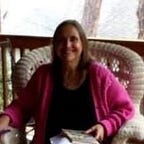How to Write a Killer First Sentence
You’ve probably heard that the first sentence of your book is the most important sentence. Your first sentence can persuade an agent or a publisher or a potential purchaser to keep reading, so it’s very important to craft that sentence with the utmost care.
With that in mind, let’s take a look at the first sentences from some of the books on my bookshelves:
- “Dr. Kay Scarpetta moves the tiny glass vial close to candlelight, illuminating a maggot drifting in a poisonous bath of ethanol.” From Blow Fly by Patricia Cornwell
- “The bottle was dropped overboard on a warm summer evening, a few hours before the rain began to fall.” From Message in a Bottle by Nicolas Sparks
- “Altogether, it was ten years, easily ten, from the hot August morning when Beth put the envelope full of pictures into the drawer until the cold fall afternoon when she took them out and laid then one by one on her desk.” From The Deep End of the Ocean by Jacquelyn Mitchard
- “My sister Kwan believes she has yin eyes.” From The Hundred Secret Senses by Amy Tan
- “Mr. and Mrs. Dursley, of number four, Privet Drive, were proud to say that they were perfectly normal, thank you very much.” From Harry Potter and the Sorcerer’s Stone by J.K. Rowling
- “I am doomed to remember a boy with a wrecked voice — not because of his voice, or because he was the smallest person I ever knew, or even because he was the instrument of my mother’s death, but because he is the reason I believe in God; I am a Christian because of Owen Meany.” From A Prayer for Owen Meany by John Irving
- “When he was nearly thirteen, my brother Jem got his arm badly broken at the elbow.” From To Kill a Mockingbird by Harper Lee
- “What can you say about a twenty-five-year-old girl who died?” From Love Story by Erich Segal
- “It happened every year, was almost a ritual.” From The Girl with the Dragon Tattoo by Stieg Larsson
- “I’m pretty much fucked.” From The Martian by Andy Weir
- “Life changes fast.” From The Year of Magical Thinking by Joan Didion (nonfiction)
These first sentences succeed because:
- They cause the reader to ask Why? Or How? Or What does that mean? Why is Dr. Scarpetta examining a maggot? How did Jem break his elbow? What are yin eyes?
- They hint at what will happen in the story, promise the questions will be answered.
Surprisingly, I had to open at least fifty books to find those eleven great openers. Some of my most favorite books’ opening sentences were meh.
Fiction writers are told to begin in the midst of exciting action. Not one of the above examples does that, and yet the books were best sellers. And the books I didn’t quote included backstory in the first sentence, which writers are told to avoid; yet they were best sellers as well.
That’s good news, and also bad news.
The good news is that if people are familiar with your work and like it, they’ll buy your book even if the first sentence is boring.
The bad news is publishing has never been as competitive, expensive, and unprofitable as it is today. Publishers only want to acquire guaranteed moneymakers. And if you don’t already have an impressive sales record, convincing a publisher your book is a moneymaker has to happen with the very first sentence, with a subject and a predicate that will grab the reader and never let go throughout all the suspenseful plot twists until the satisfying surprise ending. In other words, if you’re not famous, your first sentence must be even better than some of the examples above.
No pressure.
So, how do you write that all-important compelling first sentence?
Easy. Write the whole book.
Most of us, when writing our first draft, start with the first sentence and go through to the end (if we’re lucky, or persistent). Don’t get bogged down with the first sentence on the first draft. Write the best one you can for the time being, but know it’s going to change.
During the subsequent drafts, you develop a better idea of what your true theme is. Your protagonist’s journey gets better-defined. All your characters grow more interesting. Your plot changes in ways you couldn’t predict. You cut some of the scenes you once thought were most necessary. You may even ditch the first few chapters.
In non-fiction, your plan may change from your original outline. Your research may open up whole new avenues to explore.
When you’re pretty sure your book has grown up and is close to its final form, go back and really examine that first sentence. Does it knock the reader off balance by introducing an element of mystery? Does it hint at your theme? Does it promise the reader a thrilling odyssey to your book’s destination?
The first sentence is the most important sentence of your book. Make it spectacular.
Did you find this article helpful? Make my day — click the heart. Love you, too.
Originally published at arhtisticlicense.com on July 8, 2017.
